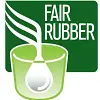
Fair Rubber
About (Fair Rubber)
Fair Rubber Standard
Fair Rubber is a standard aimed at ensuring fair trade practices within the rubber industry. This standard sets out the requirements and guidelines for fair compensation, improved working conditions, and sustainable practices in rubber production.
Purpose
The purpose of the Fair Rubber standard is to:
- Ensure that rubber producers receive fair prices for their products.
- Improve the living and working conditions of rubber farmers and workers.
- Promote sustainable and environmentally friendly practices in rubber production.
- Increase consumer awareness and support for fair trade rubber products.
Requirements
To be certified under the Fair Rubber standard, producers and companies must meet the following requirements:
- Fair Compensation:
- Producers must receive a fair price for their rubber, which covers the cost of sustainable production and provides a living wage.
- Premiums must be paid to support community development projects.
- Working Conditions:
- Workers must have safe and healthy working conditions.
- Child labor and forced labor are strictly prohibited.
- Workers must have the right to organize and bargain collectively.
- Sustainability:
- Producers must use environmentally friendly practices, such as reducing chemical use and protecting biodiversity.
- Waste management and water conservation measures must be in place.
- Transparency and Traceability:
- Supply chains must be transparent, with clear documentation of the origin and journey of the rubber.
- Regular audits and inspections must be conducted to ensure compliance with the standard.
Certification Process
The certification process for Fair Rubber involves several steps:
- Application: Producers or companies apply for certification by submitting relevant documentation and information about their practices.
- Assessment: An independent auditor assesses the applicant's compliance with the Fair Rubber standard.
- Certification: If the applicant meets all requirements, they are granted certification and can use the Fair Rubber label on their products.
- Monitoring: Regular monitoring and audits are conducted to ensure ongoing compliance with the standard.
Benefits of Fair Rubber Certification
- Economic Benefits: Certified producers receive fair prices and premiums, leading to improved economic stability.
- Social Benefits: Better working conditions, access to education, and improved health for workers and their families.
- Environmental Benefits: Sustainable practices help protect natural resources and reduce the environmental impact of rubber production.
- Consumer Trust: The Fair Rubber label assures consumers that the products they purchase are ethically and sustainably produced.
How to Support Fair Rubber
Consumers and businesses can support Fair Rubber by:
- Purchasing Certified Products: Look for the Fair Rubber label when buying rubber products.
- Spreading Awareness: Educate others about the importance of fair trade in the rubber industry.
- Becoming a Member: Join Fair Rubber e.V to support their mission and activities.
Conclusion
The Fair Rubber standard is a comprehensive framework designed to promote fairness, sustainability, and transparency in the rubber industry. By adhering to this standard, producers and companies can contribute to a more equitable and sustainable future for all stakeholders involved.